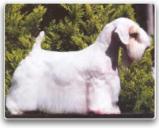
This is a placeholder text
Group text
by crumbs on 14 May 2017 - 01:05
Are you saying constant inbreeding increases genetic diveristy and reduces harmful recessives?
by vk4gsd on 14 May 2017 - 01:05
That's my contention if it is done correctly. Could be wrong, let's discuss.
Simplified, you have 5 separate lines free of each other, you take a male from one of these and breed it to all 5.
Have you reduced or increased genetic diversity over all 5 in total going forward?
Now what if that one dog carried recessive, have you reduced or increased future progeny from all 5 lines getting two recessives in the future?
by crumbs on 14 May 2017 - 02:05
Maybe punnet squares would help working it out.
https://www.hobart.k12.in.us/jkousen/Biology/psquare.htm
You're just spreading his genetics amongst many at the end of the day.
Let's say you have an organism that has a gene that enables it to survive in a hostile environment. To ensure survival of that species in that environment you want that to spread to as many offspring as possible thus ensuring the species survival.
Now replace that with a recessive unwanted gene that would have the organism dead in that environment.
Over generations your either going to ensure the species survival and it will flourish or with the unwanted gene ensure it's death.
I heard a couple of showline breeders say once it's hard to get good dark eye colour back once you've lost it.
by vk4gsd on 14 May 2017 - 02:05
Evolution has nothing to do with domestic dog breeding, actually dog breeding generally goes in the opposite direction to evolution.
Can you answer my simple questions?
by crumbs on 14 May 2017 - 03:05
I used evolution as an example of passing on genetics.
That's what you are talking about genetics. Doesn't matter if it's domesticated or not.
by vk4gsd on 14 May 2017 - 03:05
by crumbs on 14 May 2017 - 03:05
by duke1965 on 14 May 2017 - 03:05
by vk4gsd on 14 May 2017 - 03:05
Crumbs doesn't get it so I will try one last time.
Starting with a small closed population like the gsd if you continue to outcross by simple obvious math every dog eventually in the successive progeny becomes more and more inbred by simple math.
Fast forward and there ends up just one family of dogs that can only increase in line breeding coefficient and never be reversed.
Only show dog breeders don't get this.
Farmers get it, pit bull breeders got it, houndsmen get it, herding dog breeders get it....
No two line bred dogs can ever be clones, diversity will never be exhausted if you breed in line and you have the option if crossing pure line bred lines.
by Swarnendu on 14 May 2017 - 03:05
Problem is, when you create 5 distinct lines through continuous linebreeding, you eventually create 5 different breeds.
Contact information Disclaimer Privacy Statement Copyright Information Terms of Service Cookie policy ↑ Back to top





